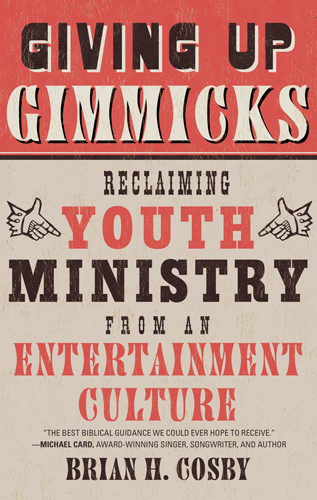
Brian Cosby
Reviewed by: Ken B. Montgomery
Giving Up Gimmicks: Reclaiming Youth Ministry from an Entertainment Culture, by Brian Cosby. Published by P&R, 2012. Paperback, 160 pages, list price $12.99. Reviewed by OP pastor Ken B. Montgomery.
The thrust of Giving up Gimmicks is that the youth of the church are to be built up in the knowledge and love of Christ, using the same means of grace that God has given to the whole body: the preaching of the Word, the faithful administration of the sacraments, and prayer. While this should not be a radical claim from a Reformed standpoint, it does cut against the grain of the prevailing methodologies of youth ministry in the wider mainline and evangelical church in the Western world. Thus, this book would serve as a helpful basic introduction to the identity and practices of the Reformed church in general, with secondary implications for youth ministry.
Sadly, one of the reasons that youth today may be leaving their churches at such an alarming rate is that the church has carved out "separate enclaves" for young people, with the result that they are not "functioning alongside and becoming an integral element of the body life of the congregation" (p. 28). The author's burden is to show the folly of trying to amuse rather than edify: to "get them in" with a smattering of fun-filled gimmicks, and then to "keep them in" with brief snippets of biblical teaching and prayer. This generation seems to appreciate being "up front" and "transparent" about one's intentions, so Cosby's question is essentially, "Why would the church then pretend to be something that it is not?" Our ministries must present the same face to all members, even as it is sensitive to the stations and capacities of each individual.
Cosby points out that in fact many young people are asking the church to give them solid instruction in biblical narrative and doctrine and what it means to be godly: "They want to understand why Presbyterians baptize infants and why prayer works. They want to explore the development of the canon of Scripture and how to defend it at school" (p. 18). In my experience at youth camps, I have also found such desire for greater theological understanding, together with questions regarding service in the church. So it is possible to give them both what they want and what they need!
Cosby's argument works if one accepts his premise that there should be a "youth pastor, youth ministry, and youth group." He does admit toward the end, "In many respects, the youth pastor is a result of the failure in the home to bring children up in the nurture and admonition of the Lord" (p. 93). But he does not then follow through with any concrete directions for restoring the family's role in catechizing and training children. Such a discussion would have rounded out the book quite nicely. However, Cosby has still offered to the church a welcome reminder and resource for thinking about ministry to covenant youth.
June 01, 2025
Anxiety: Finding the Better Story
May 25, 2025
April 27, 2025
The Devoted Mind: Seeking God’s Face in a World of Distraction
April 20, 2025
April 13, 2025
Suffering: God’s Purpose in Our Pain
April 06, 2025
Sunday Matters: 52 Devotionals to Prepare Your Heart for Church
March 30, 2025
© 2025 The Orthodox Presbyterian Church